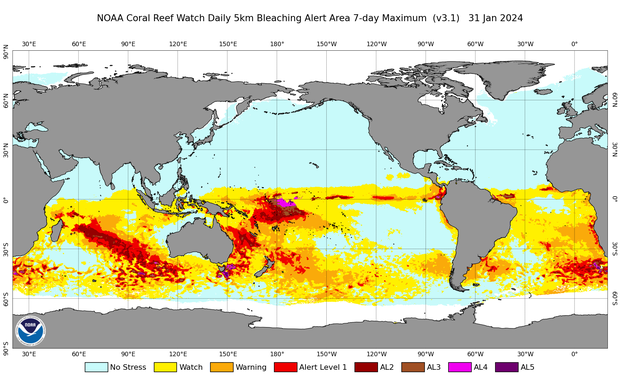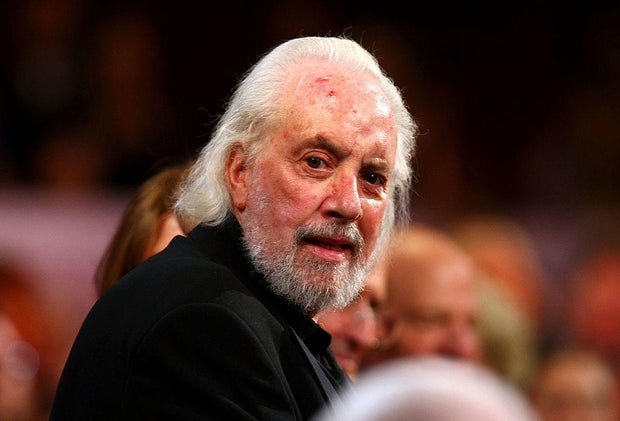CBS News
Last year’s marine heat waves were unprecedented, forcing researchers to make 3 new coral reef bleaching alert levels

Temperatures in parts of the world got so hot last year that it caused certain areas of the ocean to experience hot tub-level temperatures, which killed off essential coral reefs. The situation was unprecedented, to the point that researchers had to add three new levels to a coral bleaching warning system in an attempt to better protect marine life.
The National Oceanic and Atmospheric Administration’s Coral Reef Watch program, which uses satellites and models to monitor coral reef systems worldwide, said it revamped its bleaching alert system “in response to 2023’s unprecedented marine heatwaves.”
“The revised system provides additional detail to help coral reef managers prepare for and take action during times of extreme heat stress,” the program said on social media.
Coral bleaching occurs when the animals become overly stressed by changes in temperature, light or nutrients. When that happens, the corals expel the algae that reside within their tissues, leaving them with a white color, or as NOAA says, “bleached and vulnerable.” Bleached corals are not necessarily dead, but they rely on algae to provide them with food, so when the algae leave, corals are more susceptible to death.
According to NOAA, “increased ocean temperature caused by climate change is the leading cause of coral bleaching.”
Prior to the update, there were only two bleaching alert levels. The system now ranges from level one, “risk of reef-wide bleaching,” to level five, “risk of near complete mortality.” As of Thursday, a satellite image of heat stress alerts showed widespread coral bleaching watches in effect across the world, with several areas experiencing alert levels one and two, and at least one area in the Pacific Ocean experiencing levels four and five.
NOAA Coral reef Watch
“Significant heat stress is building across the southern hemisphere,” NOAA’s Coral Program posted on social media, saying that coral bleaching is expected “throughout much of the Indian Ocean and the central equatorial and southwestern Pacific, including the Great Barrier Reef,” over the next few months.
The continuation of El Niño is certain to play a role. In its January update, NOAA said the weather phenomenon is “very likely close to peak strength and is likely to continue for the next few months.” It will gradually weaken, but its “impacts to global climate will continue,” NOAA said.
El Niño typically creates warmer sea surface temperatures in the Pacific Ocean. Those temperatures usually peak between December and January. In December, NOAA found that the sea surface temperature in a key monitoring region in the Pacific was 2.1 degrees Celsius above the 1991-2020 average for that area.
The revamped bleaching alert system comes after 2023 was designated as the hottest year ever recorded. Last summer, it was so warm that some spots off the Florida coast saw ocean temperatures surpass 100 degrees Fahrenheit, even reaching temperatures used in hot tubs. In July, a coral reef restoration site off the coast faced an “unimaginable” fate, according to researchers – “100% coral mortality.”
“The vibrant coral reefs of Florida, crucial to the local community and the state’s economy, are facing a severe and urgent crisis due to soaring water temperatures,” the Coral Restoration Foundation said at the time of the discovery. “The potential loss of coral populations within the Florida Keys National Marine Sanctuary is quickly becoming an alarming reality.”
CBS News
7/2: CBS Evening News – CBS News

Watch CBS News
Be the first to know
Get browser notifications for breaking news, live events, and exclusive reporting.
CBS News
Robert Towne, legendary Hollywood screenwriter of “Chinatown,” dies at 89

Robert Towne, the Oscar-winning screenplay writer of “Shampoo,” “The Last Detail” and other acclaimed films whose work on “Chinatown” became a model of the art form and helped define the jaded allure of his native Los Angeles, has died. He was 89.
Towne “passed away peacefully surrounded by his loving family” Monday at his home in Los Angeles, his publicist Carri McClure, told CBS News in a statement. She did not provide a cause of death.
In an industry which gave birth to rueful jokes about the writer’s status, Towne for a time held prestige comparable to the actors and directors he worked with. Through his friendships with two of the biggest stars of the 1960s and ’70s, Warren Beatty and Jack Nicholson, he wrote or co-wrote some of the signature films of an era when artists held an unusual level of creative control. The rare “auteur” among screen writers, Towne managed to bring a highly personal and influential vision of Los Angeles onto the screen.
Alberto E. Rodriguez/Getty Images for AFI
“It’s a city that’s so illusory,” Towne told The Associated Press in a 2006 interview. “It’s the westernmost west of America. It’s a sort of place of last resort. It’s a place where, in a word, people go to make their dreams come true. And they’re forever disappointed.”
Recognizable around Hollywood for his high forehead and full beard, Towne won an Academy Award for “Chinatown” and was nominated three other times, for “The Last Detail,” “Shampoo” and “Greystoke.” In 1997, he received a lifetime achievement award from the Writers Guild of America.
“His life, like the characters he created, was incisive, iconoclastic and entirely (original),” said “Shampoo” actor Lee Grant on X.
Towne was born Robert Bertram Schwartz in Los Angeles and moved to San Pedro after his father’s business, a dress shop, closed down because of the Great Depression. His father changed the family name to Towne.
Towne’s success came after a long stretch of working in television, including “The Man from U.N.C.L.E” and “The Lloyd Bridges Show,” and on low-budget movies for “B” producer Roger Corman. In a classic show business story, he owed his breakthrough in part to his psychiatrist, through whom he met Beatty, a fellow patient. As Beatty worked on “Bonnie and Clyde,” he brought in Towne for revisions of the Robert Benton-David Newman script and had him on the set while the movie was filmed in Texas.
Towne’s contributions were uncredited for “Bonnie and Clyde,” the landmark crime film released in 1967, and for years he was a favorite ghost writer. He helped out on “The Godfather,” “The Parallax View” and “Heaven Can Wait” among others and referred to himself as a “relief pitcher who could come in for an inning, not pitch the whole game.” But Towne was credited by name for Nicholson’s macho “The Last Detail” and Beatty’s sex comedy “Shampoo” and was immortalized by “Chinatown,” the 1974 thriller set during the Great Depression.
“Chinatown” was directed by Roman Polanski and starred Nicholson as J.J. “Jake” Gittes, a private detective asked to follow the husband of Evelyn Mulwray (played by Faye Dunaway). The husband is chief engineer of the Los Angeles Department of Water and Power and Gittes finds himself caught in a chaotic spiral of corruption and violence, embodied by Evelyn’s ruthless father, Noah Cross (John Huston).
Influenced by the fiction of Raymond Chandler, Towne resurrected the menace and mood of a classic Los Angeles film noir, but cast Gittes’ labyrinthine odyssey across a grander and more insidious portrait of Southern California. Clues accumulate into a timeless detective tale, and lead helplessly to tragedy, summed up by one of the most repeated lines in movie history, words of grim fatalism a devastated Gittes receives from his partner Lawrence Walsh (Joe Mantell): “Forget it, Jake, it’s Chinatown.”
The back story of “Chinatown” has itself become a kind of detective story, explored in producer Robert Evans’ memoir, “The Kid Stays in the Picture”; in Peter Biskind’s “East Riders, Raging Bulls,” a history of 1960s-1970s Hollywood, and in Sam Wasson’s “The Big Goodbye,” dedicated entirely to “Chinatown.” In “The Big Goodbye,” published in 2020, Wasson alleged that Towne was helped extensively by a ghost writer — former college roommate Edward Taylor. According to “The Big Goodbye,” for which Towne declined to be interviewed, Taylor did not ask for credit on the film because his “friendship with Robert” mattered more.
The studios assumed more power after the mid-1970s and Towne’s standing declined. His own efforts at directing, including “Personal Best” and “Tequila Sunrise,” had mixed results. “The Two Jakes,” the long-awaited sequel to “Chinatown,” was a commercial and critical disappointment when released in 1990 and led to a temporary estrangement between Towne and Nicholson.
Around the same time, he agreed to work on a movie far removed from the art-house aspirations of the ’70s, the Don Simpson-Jerry Bruckheimer production “Days of Thunder,” starring Tom Cruise as a race car driver and Robert Duvall as his crew chief. The 1990 movie was famously over budget and mostly panned, although its admirers include Quentin Tarantino and countless racing fans. And Towne’s script popularized an expression used by Duvall after Cruise complains another car slammed him: “He didn’t slam into you, he didn’t bump you, he didn’t nudge you. He rubbed you.
“And rubbin,′ son, is racin.'”
Towne later worked with Cruise on “The Firm” and the first two “Mission: Impossible” movies. His most recent film was “Ask the Dust,” a Los Angeles story he wrote and directed that came out in 2006. Towne was married twice, the second time to Luisa Gaule, and had two children. His brother, Roger Towne, also wrote screenplays, his credits include “The Natural.”
CBS News
Analyzing impact of Supreme Court’s Trump immunity decision

Watch CBS News
Be the first to know
Get browser notifications for breaking news, live events, and exclusive reporting.











